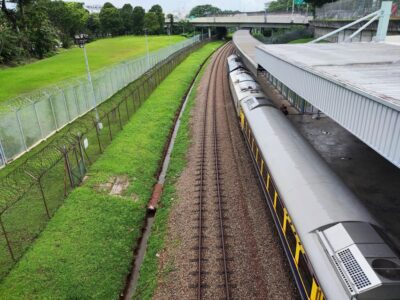China housing slump deepens as oversupply drags prices
Concerns remain over surplus inventory built by troubled Chinese property developers as prices continue to fall across all but a handful of major cities

When Evergrande Group’s stock was delisted in Hong Kong on August 25, it came as little surprise to the markets. Shares had been suspended for 18 months, since January 2024, leading to automatic removal from the Hong Kong Stock Exchange, as flagged by the regulator two weeks in advance.
“In terms of market impact, the delisting barely moves the needle,” says David Zhang, a policy analyst at Trivium, a Beijing-based intelligence advisory. “Evergrande has been the face of China’s property crisis for years, and markets have thoroughly digested each stage of its collapse.”
Yet the fallout within the group and among partners continues. Hundreds of Evergrande projects remain incomplete, and fears linger that the company’s slow demise acts as both a contagion and precursor for other large, indebted Chinese developers.
A week before the delisting, a court in Guangzhou instructed subsidiary Evergrande Real Estate Guangdong to begin bankruptcy proceedings. The following day, financial partner Shengjing Bank announced its own delisting from the mainland and Hong Kong. Formerly part-owned by Evergrande, the bank’s decline has mirrored that of its former parent, with trading volumes in Shengjing Bank stock negligible in recent months as investors steered clear of Evergrande-affected assets. Based in Shenyang in the north-east, Shengjing Bank’s customers are mainly from the surrounding region, thousands of kilometres from Evergrande’s Guangzhou headquarters—an indication of how far the financial fallout has spread.
Guangdong, Evergrande’s home province, remains the most affected in terms of unfinished residential projects, with more than 150 still to be completed. Yet its plethora of empty housing units—and the many buyers who have paid deposits but remain unable to move in—extends nationwide.

In Sichuan, Evergrande has yet to complete 85 residential sites; 67 in Shandong; and 60 in Liaoning, among dozens of other provinces. Last year, there were an estimated 48 million pre-sold homes across China awaiting completion including those by Evergrande and other indebted developers, according to Bloomberg Intelligence.
“What really matters now is whether the surviving property giants, who remain under severe financial strain, can weather the storm,” says Zhang of Trivium. “If household names like Country Garden or Vanke were to go the way of Evergrande, it would look to many Chinese as proof that years of government intervention hadn’t worked, and the damage to confidence would be far greater.”
The continued slide in housing prices indicates that underlying market dynamics remain weak, with no end in sight. Of the largest cities in China, only Shanghai and Hangzhou recorded price growth on new housing units above one percent in the year to July, and just five of 70 cities saw any increase at all. Worse still, the second-hand housing market recorded price declines in every major city, according to official central government data released in August. Among the three worst performers for new builds, two—Beihai and Tangshan—were tier-three cities, with declines of 6.7 and 6.5 percent respectively.
Recent data further suggests “the divergence is widening” between dynamic hubs such as Shanghai and Hangzhou and smaller cities, which remain “oversupplied and weak,” says James Macdonald, head of research for China at Savills, who describes the positive official data for Shanghai and Hangzhou as “somewhat misleading.”
“In Shanghai, much of the uplift comes from new launches in prime central areas where caps on sale prices have been loosened, pushing values higher,” says Macdonald. “Broader suburban areas and the second-hand market remain weak, so the growth figure does not reflect a broad-based recovery. Hangzhou shows similar dynamics.
Shanghai has continued to show mixed signs in recent months, with sales of new high-end units plummeting by more than 50 percent in the second quarter compared to the first. But average transaction prices and second-hand unit volumes are rising, according to Savills data.
The decrease in new, high-end sales is partly due to a fall in new project launches, as developers seek to match supply to still fragile demand for fear of further fuelling the market’s chief problem: oversupply.
Shanghai’s city government continues efforts to clear inventory and boost sales. In June, Minhang District acquired 7,500 square metres of unsold housing stock and converted it to rentals. In late August, the city government announced a further relaxation of housing purchase restrictions outside the outer ring road, alongside additional reductions in mortgage costs, in its latest bid to spur the market.
In May, China’s central bank cut benchmark rates, continuing a downward trend in mortgage costs. By August, average mortgage rates in China had fallen to about 3.13 percent, down from 3.35 percent a year earlier. In Shanghai, rates had dropped to just above three percent by July, down from just over five percent in 2021 when China’s housing crisis began.
Chengdu, in south-western China, is one of the few cities to have recorded any residential price growth over the past year, fuelled partly by a sharp reduction in supply within its first ring road. This led to a 6.5 percent increase in house prices in central Chengdu in the first half of 2025 compared to the same period in 2024, “driven by strong demand and rapid inventory reduction,” says Sophy Pan, Savills’ senior research manager for Western China. The Chengdu government earlier this year unveiled plans to cut new land supply, particularly in areas with backlogs of unfinished or unsold units.

While Chengdu has seen partial recovery, neighbouring Kunming in Yunnan province remains the worst-performing large market in the country, with prices down 6.9 percent in the year to July.
Whether the wider economy can help stabilise China’s property sector remains unclear. Stronger-than-expected economic data in the second quarter showed 5.3 percent growth for the first half of the year, above the government’s five percent annual target, spurring optimism among analysts.
Morgan Stanley, Goldman Sachs, UBS, and Nomura raised GDP forecasts as new economic data and a mid-May USChina agreement saw tariffs on Chinese goods fall from 135 to 30 percent.
The speculative appetite that once drove sales has largely evaporated, leaving limited demand beyond genuine end-users
“However, the temporary nature of the tariff reductions and unresolved structural issues underscore the need for continued negotiations,” according to a second-quarter China outlook by BBVA Research.
Although stronger economic performance is expected to boost consumer confidence, the housing market is still some way from benefiting. Smaller markets require more than a lift in optimism, says Macdonald of Savills.
“The issue is less about sentiment and more about fundamental oversupply,” he says. “Even if every household purchased one unit, many markets would still be left with excess stock.”
This bleak outlook points to a “new normal” for China’s housing market, in which the pre-pandemic scramble by speculative investors to buy new units appears over, at least for now.
The central government had long sought to curb speculation, although likely not to such a drastic extent. In late 2016, President Xi Jinping first declared his now infamous statement “Houses are for living in, not for speculation,” which shaped policy before and after the global pandemic. Observers note the slogan has largely disappeared from official pronouncements since August 2025, when Economic Daily printed an editorial insisting the principle was “not out of date.” Whether by accident or design, Xi’s phrase has become less state policy and more reality nearly a decade later, particularly in smaller cities.
“The speculative appetite that once drove sales has largely evaporated, leaving limited demand beyond genuine end-users,” says Macdonald. “Without price appreciation prospects, investors have little incentive to buy, and that weighs heavily on these markets.”
This article was originally published on asiarealestatesummit.com. Write to our editors at [email protected].
Recommended
From Niseko to Tokyo luxury real estate demand stays firm
Luxury real estate in the nation, from ski resorts to city penthouses, continues to attract international buyers and investors
Thailand advances digital finance with blockchain real estate push
Issues over marrying blockchain incentives to a physical asset class is hampering Thailand’s digital finance push
Johor Bahru emerges as a key economic partner to Singapore
Once regarded as a poor relation across the causeway, Johor Bahru is cementing its status as an integrated economic partner to Singapore
Vietnam sets new rules to reward clean energy producers
Vietnam’s government has passed new regulations allowing homeowners and landlords to sell solar power back to the national grid for the first time







